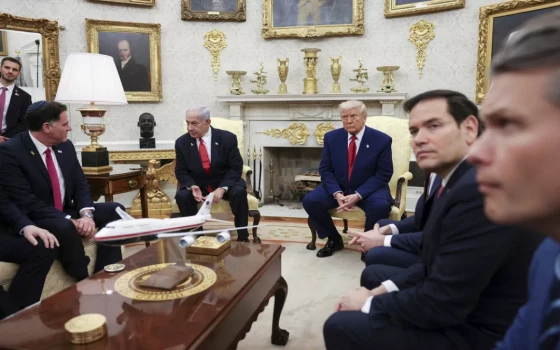
Why was Netanyahu's visit to Washington "disappointing"?

- Europe and Arabs
- Tuesday , 8 April 2025 9:12 AM GMT
Brussels: Europe and the Arabs
Prime Minister Benjamin Netanyahu's visit to the White House did not live up to Tel Aviv's expectations. The meeting, which ended quickly and unusually, raised suspicions in Israeli circles, especially since the Likud Party leader made no progress on the issues he had rushed to Washington. According to a report from the European news network Euronews in Brussels on Tuesday, the White House's cancellation of a joint press conference between President Donald Trump and Benjamin Netanyahu shortly before the latter's arrival sparked outrage not only internationally but also in Israel, raising questions about the contentious issues that have created a chill between the two close leaders.
1- Announcing direct negotiations with Iran
The Hebrew newspaper Yedioth Ahronoth described the prime minister's discomfort during his meeting with Trump, saying that the former "swallowed his saliva and glanced left and right, then grumbled and lowered his head when he heard the US president's surprising statement regarding direct negotiations with Iran." The newspaper confirmed that Netanyahu "wasn't the only one surprised by the announcement, as some figures in the US administration were unaware that Trump would announce negotiations with Iran in Netanyahu's presence."
The newspaper noted that Tel Aviv was aware of indirect negotiations between Washington and Tehran, with the Sultanate of Oman playing the role of mediator, but it hadn't imagined that the Republican leader would engage in direct negotiations with the Islamic Republic. Talks with Iran must take place "after a severe blow is delivered," not before, according to a well-informed source.
In this context, the newspaper "Israel Hayom" quoted a source in the Israeli delegation as saying that the shock was evident on the faces of the Israeli delegation in Washington.
While direct negotiations between the two adversaries are taken for granted to discuss the future of Iran's nuclear program, the statement by Tehran's Foreign Minister, Abbas Araghchi, regarding his country's insistence on continuing indirect dialogue was striking, which in itself constitutes an escalation. Iran's Nour News Agency reported that US Middle East envoy Steve Witkoff will represent Washington in the negotiations, while Omani Foreign Minister Badr al-Busaidi will mediate on behalf of Tehran in the talks, which will begin on Saturday.
2- Trump's insistence on imposing tariffs on Israel
When Netanyahu arrived in Washington from Budapest, he boasted of being "the first foreign leader" to meet with Trump to discuss the newly imposed US tariffs.
The extent of Netanyahu's interest in this issue was clear, given the diplomatic meetings he held prior to his meeting with the Republican leader.
The Likud leader promised to lift the 17% tariff on his country, saying, "I hope I can help with this issue. This is my goal. I am the first foreign leader who will meet with Trump to discuss this very important issue for the Israeli economy."
He also pledged to eliminate the trade deficit with the United States, which rose by 8.6% to $7.4 billion last year, according to data from the US Trade Representative. However, his efforts have not yielded tangible results in this regard, according to the Israeli Broadcasting Authority.
3- Trump loves Erdogan, and the latter reciprocates.
Recently, talk of the threat posed by the Turkish presence in Syria has gained momentum in light of recent developments in the region. Some Hebrew media outlets have even clearly indicated that Ankara's threat has replaced the "Shiite" threat posed by Tehran.
However, the Republican leader's statements, in which he said he has a close relationship with his Turkish counterpart, Recep Tayyip Erdogan, and that he asked Tel Aviv to "act rationally to resolve any problems with Ankara," revealed a disagreement between Washington and Tel Aviv regarding the Turkish presence in the region.












No Comments Found